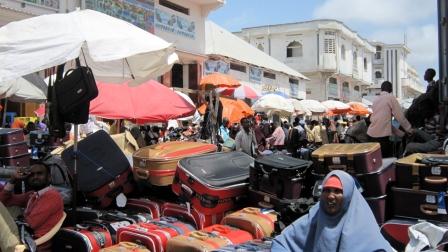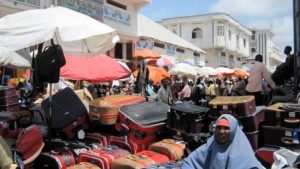Who Is Getting Somalia Wrong?

That statement was for a good reason. Burnett, whom NPR dispatched to Nairobi this year to help beef up its Africa bureau, had just reported about the incredible work that was being done by The Tanzania Heritage Project to help preserve historical archives and tapes of Tanzania’s oldest broadcasting house, Radio Tanzania.
I thought the story was very enriching and heartwarming. I heard it while driving during a Saturday morning errand in Denver, Colorado. I am a fan of old fashion radio listening. I had to stop for a while during that morning drive, just to make sure I noted the story somewhere so I could return to it when I got home.
You can listen to the report here to understand what I am talking about.
That was on November 3. A few weeks later, on November 26, Burnett reported about Somalia.
Somalia, the African nation often equated by Western journalists with chaos in Africa was seeing “revival”, thanks to the work of returning Somalia expatriates like Ahmed Jama, whom Burnett said, was “doing his part to revive Mogadishu one prawn at a time.”
The Somali native lived in London but had returned home to start a local business, cooking prawns, lamb, and lobster tails and vegetables to serve his fellow Somalis. He had plans to open up more businesses in Mogadishu, the Somalia capital city where safety remains a big issue.
The story about the revival of Mogadishu remained interesting until when talk about safety popped in. And then Burnett narrated what happened to Jama’s business.
“On the night of Sept. 20, a crowd was enjoying tea and political gossip at his eatery in central Mogadishu across from the National Theater, when two men wearing explosive vests blew themselves up in the dining room. The blasts killed 14 people — including three Somali journalists — and injured 20,” according to Burnett.
Which brings into question the often-debated issue of how journalists present African news to international audiences? What are the challenges involved with this kind of reporting, or are journalists helpless with balancing progress in Somalia against the backdrop of violence?
The other question is, who plays the arbiter in the face of an increasingly complex dynamic of African news reporting? There are no referees in this game. So, anything goes.
Is Somalia making progress or is Somalia not making progress? That is the question that needs clear answers.
Recently the stream of news about the country has, mostly, been on the positive side.
Somalia gets first female foreign minister. Somalia picks a new leader in presidential elections. Somalia parliament endorses new government.
So, the internet and many a news outlet are littered with all these stories about amazing things going on in Somalia, only to be shattered with a bombshell of stories about rebels and an insurgency of pirates and Al-Qaeda. And then the narrative suddenly swings.
This leads me to Albany Associates, the U.K based PR firm which is bent on protecting the image that Somalia and its government want to project to the rest of the world.
In addition to other operations in Africa, the Democratic Republic of Congo(DRC), Sudan, Rwanda, Sierra Leone, and other nations around the world, Albany runs a Somalia Project aimed “to develop positive messaging for AMISOM and the Somali Transitional Federal Government (TFG),” according to Marissa Moran a research associate with the firm.
That transitional Somali government (TFG) is what led to the newly installed Somali government and worked with the African Union’s Mission to Somalia (AMISOM) to help the nation move forward.
Albany’s project with the TFG and AMISOM involves “working with international journalists to understand the holistic situation in Somalia and bring that story back to international readers,” according to Moran, who communicated with me via email.
Asked whether the international media may be exacerbating the situation in Somalia, Moran told me, “Ultimately, there is much more happening in Somalia – both good and bad – that needs attention in order to move forward.”
She says, “By recognising the positive things that have happened in the country in the past 20 years (ie a thriving telecommunications network; continued pastoral herding enterprises) then the international community can see what Somalia has to offer to the world and invest in it instead of throwing temporary funding for things that are not central to the Somali people.”
Moran took the time to point me to a book by the BBC’s Mary Harper called Getting Somalia Wrong, adding that, “There’s a problem of discrimination and prejudice toward Somalis in the west because all people know of Somalia are pirates and terrorists.”
NPR’s Michel Martin extrapolated on Harper’s book on November 29 on her show Tell Me More. Is The World ‘Getting Somalia Wrong?
Without cherry-picking stories from NPR, which in my estimation has done a tremendous job with its reporting throughout Africa, Somalia may not be the exception, but rather the rule in journalistic frustration with Africa.
Moran sounds a cautionary note with regards to Somalia and what journalists need to do.
“Once things are showing progress and it’s safe, international media has to make an effort to visit a place. Budget cuts and logistical restraints prevent many international media from getting on the ground, but you cannot cover a complex conflict from a regional bureau office. When reporters from Al Jazeera, The New York Times, Sky News, etc have come to Mogadishu, Albany helps them get access to see what’s really happening so that they can get the real story,” she said.

